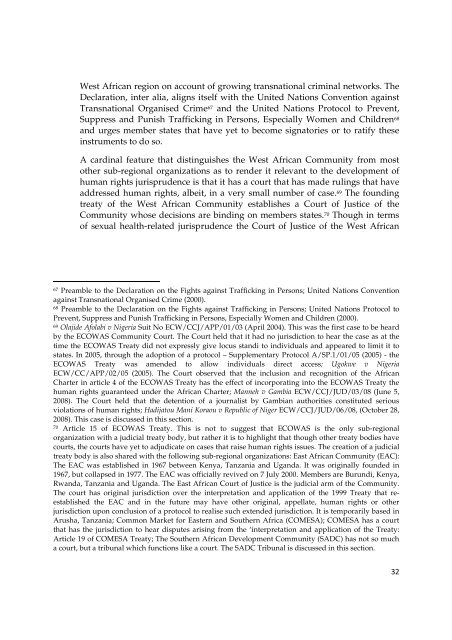sexual health and human rights in the african region - The ICHRP
sexual health and human rights in the african region - The ICHRP
sexual health and human rights in the african region - The ICHRP
You also want an ePaper? Increase the reach of your titles
YUMPU automatically turns print PDFs into web optimized ePapers that Google loves.
West African <strong>region</strong> on account of grow<strong>in</strong>g transnational crim<strong>in</strong>al networks. <strong>The</strong><br />
Declaration, <strong>in</strong>ter alia, aligns itself with <strong>the</strong> United Nations Convention aga<strong>in</strong>st<br />
Transnational Organised Crime 67 <strong>and</strong> <strong>the</strong> United Nations Protocol to Prevent,<br />
Suppress <strong>and</strong> Punish Traffick<strong>in</strong>g <strong>in</strong> Persons, Especially Women <strong>and</strong> Children 68<br />
<strong>and</strong> urges member states that have yet to become signatories or to ratify <strong>the</strong>se<br />
<strong>in</strong>struments to do so.<br />
A card<strong>in</strong>al feature that dist<strong>in</strong>guishes <strong>the</strong> West African Community from most<br />
o<strong>the</strong>r sub-<strong>region</strong>al organizations as to render it relevant to <strong>the</strong> development of<br />
<strong>human</strong> <strong>rights</strong> jurisprudence is that it has a court that has made rul<strong>in</strong>gs that have<br />
addressed <strong>human</strong> <strong>rights</strong>, albeit, <strong>in</strong> a very small number of case. 69 <strong>The</strong> found<strong>in</strong>g<br />
treaty of <strong>the</strong> West African Community establishes a Court of Justice of <strong>the</strong><br />
Community whose decisions are b<strong>in</strong>d<strong>in</strong>g on members states. 70 Though <strong>in</strong> terms<br />
of <strong>sexual</strong> <strong>health</strong>-related jurisprudence <strong>the</strong> Court of Justice of <strong>the</strong> West African<br />
67 Preamble to <strong>the</strong> Declaration on <strong>the</strong> Fights aga<strong>in</strong>st Traffick<strong>in</strong>g <strong>in</strong> Persons; United Nations Convention<br />
aga<strong>in</strong>st Transnational Organised Crime (2000).<br />
68 Preamble to <strong>the</strong> Declaration on <strong>the</strong> Fights aga<strong>in</strong>st Traffick<strong>in</strong>g <strong>in</strong> Persons; United Nations Protocol to<br />
Prevent, Suppress <strong>and</strong> Punish Traffick<strong>in</strong>g <strong>in</strong> Persons, Especially Women <strong>and</strong> Children (2000).<br />
69 Olajide Afolabi v Nigeria Suit No ECW/CCJ/APP/01/03 (April 2004). This was <strong>the</strong> first case to be heard<br />
by <strong>the</strong> ECOWAS Community Court. <strong>The</strong> Court held that it had no jurisdiction to hear <strong>the</strong> case as at <strong>the</strong><br />
time <strong>the</strong> ECOWAS Treaty did not expressly give locus st<strong>and</strong>i to <strong>in</strong>dividuals <strong>and</strong> appeared to limit it to<br />
states. In 2005, through <strong>the</strong> adoption of a protocol – Supplementary Protocol A/SP.1/01/05 (2005) - <strong>the</strong><br />
ECOWAS Treaty was amended to allow <strong>in</strong>dividuals direct access; Ugokwe v Nigeria<br />
ECW/CC/APP/02/05 (2005). <strong>The</strong> Court observed that <strong>the</strong> <strong>in</strong>clusion <strong>and</strong> recognition of <strong>the</strong> African<br />
Charter <strong>in</strong> article 4 of <strong>the</strong> ECOWAS Treaty has <strong>the</strong> effect of <strong>in</strong>corporat<strong>in</strong>g <strong>in</strong>to <strong>the</strong> ECOWAS Treaty <strong>the</strong><br />
<strong>human</strong> <strong>rights</strong> guaranteed under <strong>the</strong> African Charter; Manneh v Gambia ECW/CCJ/JUD/03/08 (June 5,<br />
2008). <strong>The</strong> Court held that <strong>the</strong> detention of a journalist by Gambian authorities constituted serious<br />
violations of <strong>human</strong> <strong>rights</strong>; Hadijatou Mani Koraou v Republic of Niger ECW/CCJ/JUD/06/08, (October 28,<br />
2008). This case is discussed <strong>in</strong> this section.<br />
70 Article 15 of ECOWAS Treaty. This is not to suggest that ECOWAS is <strong>the</strong> only sub-<strong>region</strong>al<br />
organization with a judicial treaty body, but ra<strong>the</strong>r it is to highlight that though o<strong>the</strong>r treaty bodies have<br />
courts, <strong>the</strong> courts have yet to adjudicate on cases that raise <strong>human</strong> <strong>rights</strong> issues. <strong>The</strong> creation of a judicial<br />
treaty body is also shared with <strong>the</strong> follow<strong>in</strong>g sub-<strong>region</strong>al organizations: East African Community (EAC):<br />
<strong>The</strong> EAC was established <strong>in</strong> 1967 between Kenya, Tanzania <strong>and</strong> Ug<strong>and</strong>a. It was orig<strong>in</strong>ally founded <strong>in</strong><br />
1967, but collapsed <strong>in</strong> 1977. <strong>The</strong> EAC was officially revived on 7 July 2000. Members are Burundi, Kenya,<br />
Rw<strong>and</strong>a, Tanzania <strong>and</strong> Ug<strong>and</strong>a. <strong>The</strong> East African Court of Justice is <strong>the</strong> judicial arm of <strong>the</strong> Community.<br />
<strong>The</strong> court has orig<strong>in</strong>al jurisdiction over <strong>the</strong> <strong>in</strong>terpretation <strong>and</strong> application of <strong>the</strong> 1999 Treaty that reestablished<br />
<strong>the</strong> EAC <strong>and</strong> <strong>in</strong> <strong>the</strong> future may have o<strong>the</strong>r orig<strong>in</strong>al, appellate, <strong>human</strong> <strong>rights</strong> or o<strong>the</strong>r<br />
jurisdiction upon conclusion of a protocol to realise such extended jurisdiction. It is temporarily based <strong>in</strong><br />
Arusha, Tanzania; Common Market for Eastern <strong>and</strong> Sou<strong>the</strong>rn Africa (COMESA); COMESA has a court<br />
that has <strong>the</strong> jurisdiction to hear disputes aris<strong>in</strong>g from <strong>the</strong> ‘<strong>in</strong>terpretation <strong>and</strong> application of <strong>the</strong> Treaty:<br />
Article 19 of COMESA Treaty; <strong>The</strong> Sou<strong>the</strong>rn African Development Community (SADC) has not so much<br />
a court, but a tribunal which functions like a court. <strong>The</strong> SADC Tribunal is discussed <strong>in</strong> this section.<br />
32
















